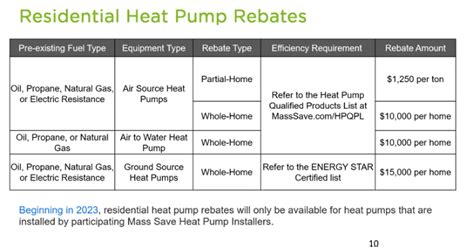As homeowners in Massachusetts explore energy-efficient heating and cooling solutions, heat pumps have gained considerable attention. These versatile systems not only enhance indoor comfort but also promise significant savings on energy bills. However, the upfront costs can be daunting. Fortunately, Massachusetts offers various rebates and incentives to offset these expenses. This guide aims to equip you with all the information you need to maximize your savings through heat pump rebates.
Understanding Heat Pumps
A heat pump is an energy-efficient device that transfers heat between the inside of your home and the outside environment. In winter, it extracts heat from the outside air (even in cold temperatures) and brings it indoors. In summer, it reverses the process by removing heat from your home and expelling it outside. The benefits of heat pumps include lower energy costs, reduced carbon footprint, and eligibility for various rebates.
Why Choose Heat Pumps?
Heat pumps are often cited as one of the most efficient heating and cooling systems available today. They consume significantly less energy compared to traditional oil, gas, or electric heating systems. Furthermore, many models now have a high SEER (Seasonal Energy Efficiency Ratio) and HSPF (Heating Season Performance Factor) ratings, ensuring maximum efficiency and comfort.
Massachusetts Heat Pump Rebates Overview
The Massachusetts government, through its energy efficiency programs, provides homeowners with various incentives to promote the transition to heat pumps. The primary goal is to reduce energy consumption and lower greenhouse gas emissions across the state.
1. Mass Save Program
The Mass Save program offers rebates for the purchase and installation of qualifying heat pump systems. Homeowners can receive substantial rebates based on the system’s efficiency ratings. For instance:
- Up to $1,500 rebate for single-zone ductless heat pumps.
- Up to $2,500 rebate for multi-zone and centralized heat pump systems.
To qualify for these rebates, your new heat pump must meet specific efficiency criteria as outlined by the program.
2. Federal Tax Credits
On a federal level, homeowners can also take advantage of the federal tax credits for heat pump installation, which allows you to deduct a percentage of the installation costs from your federal income tax. Ensure you keep all receipts and documents to support your application.
3. Additional Local Rebates and Incentives
Different municipalities and utility companies in Massachusetts may offer additional rebates and incentives for heat pump installation. Check with your local utility provider for specific programs that may apply to you.
How to Apply for Heat Pump Rebates
Applying for rebates in Massachusetts is a straightforward process. Here’s a step-by-step guide:
- Research: Start by researching the types of heat pumps available and their efficiency ratings. Ensure you select a system that qualifies for rebates.
- Consult a Professional: Contact a licensed HVAC contractor who is familiar with the Mass Save program to assist you in choosing the right system.
- Gather Documentation: Collect all necessary documentation, including purchase receipts, model numbers, and proof of installation.
- Submit Your Application: Complete and submit your rebate application to Mass Save. Applications can typically be submitted online or via mail.
- Follow Up: Keep track of your application status by following up with Mass Save or your local utility provider.
Important Considerations
When considering heat pump installation, keep the following in mind:
- Eligibility: Make sure your heat pump system meets all eligibility requirements set by the rebate program.
- Quality Installation: The efficiency of your heat pump greatly depends on its proper installation. Always hire experienced and licensed contractors.
- Beware of Scams: With the increasing popularity of heat pumps, always check credentials and reviews for contractors to avoid unreliable services.
Conclusion
Heat pumps represent a reliable and efficient option for heating and cooling your home in Massachusetts. By taking advantage of the available rebates, you can significantly reduce initial installation costs, making it an attractive option for energy-conscious homeowners. Be sure to do thorough research and work closely with qualified professionals to ensure you maximize your savings through these programs. Transitioning to a heat pump system not only benefits your wallet but also contributes positively to the environment.
FAQs
1. How much can I save by using heat pumps?
Depending on the type and efficiency of the heat pump, savings can range from 30% to 50% on your annual heating and cooling costs.
2. Are heat pumps effective in cold weather?
Yes, modern heat pumps are designed to operate efficiently in colder temperatures, providing heating even when outdoor temperatures drop significantly.
3. How long does the installation process take?
Installation typically takes a few hours to a full day, depending on the type of system you choose and your home’s specific requirements.
4. Can I combine different rebates?
Yes, homeowners can often combine multiple rebates, including state and federal credits, to maximize savings. Always confirm details with the relevant programs.
5. Are there maintenance costs associated with heat pumps?
Like any HVAC system, heat pumps require regular maintenance to operate efficiently. It is generally recommended to schedule annual check-ups to keep your unit in top condition.
Download Heat Pump Rebate Massachusetts
